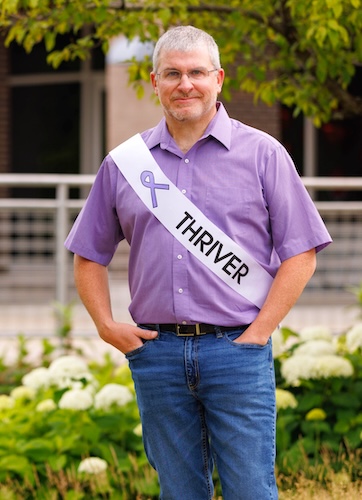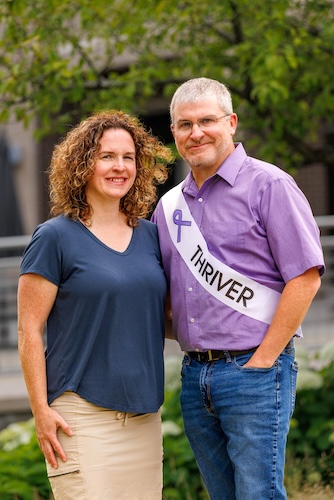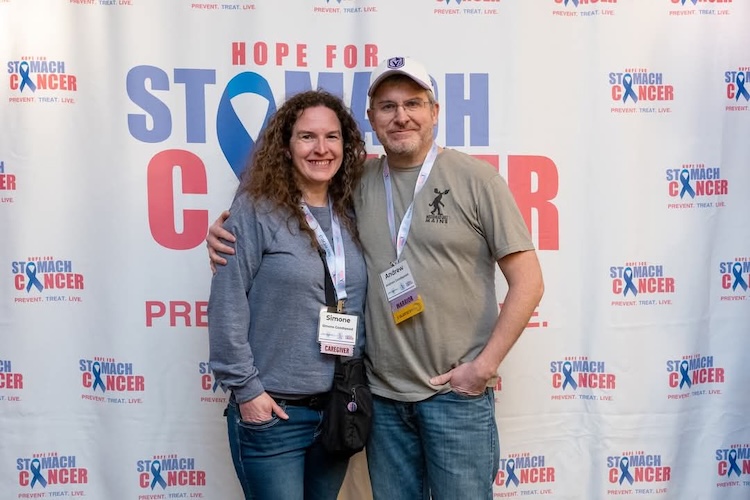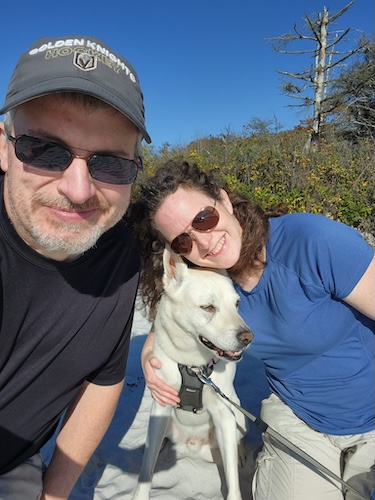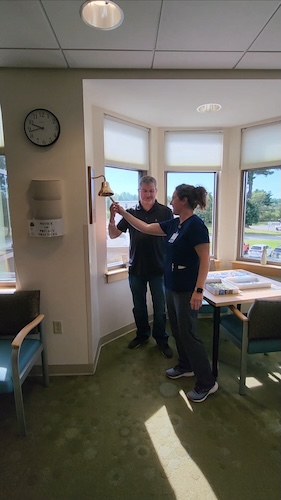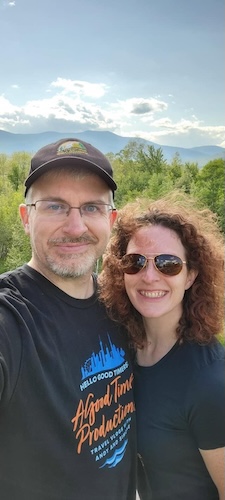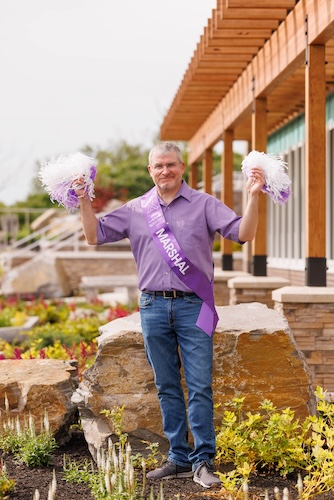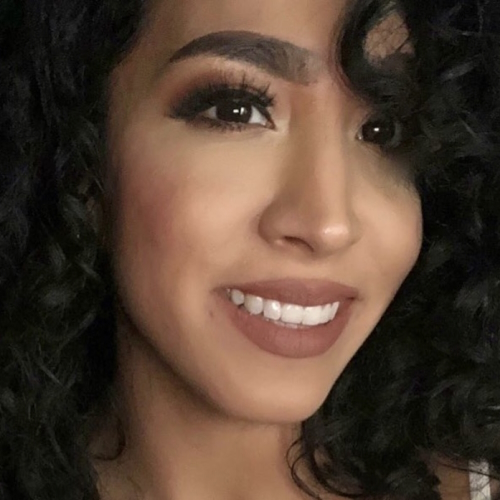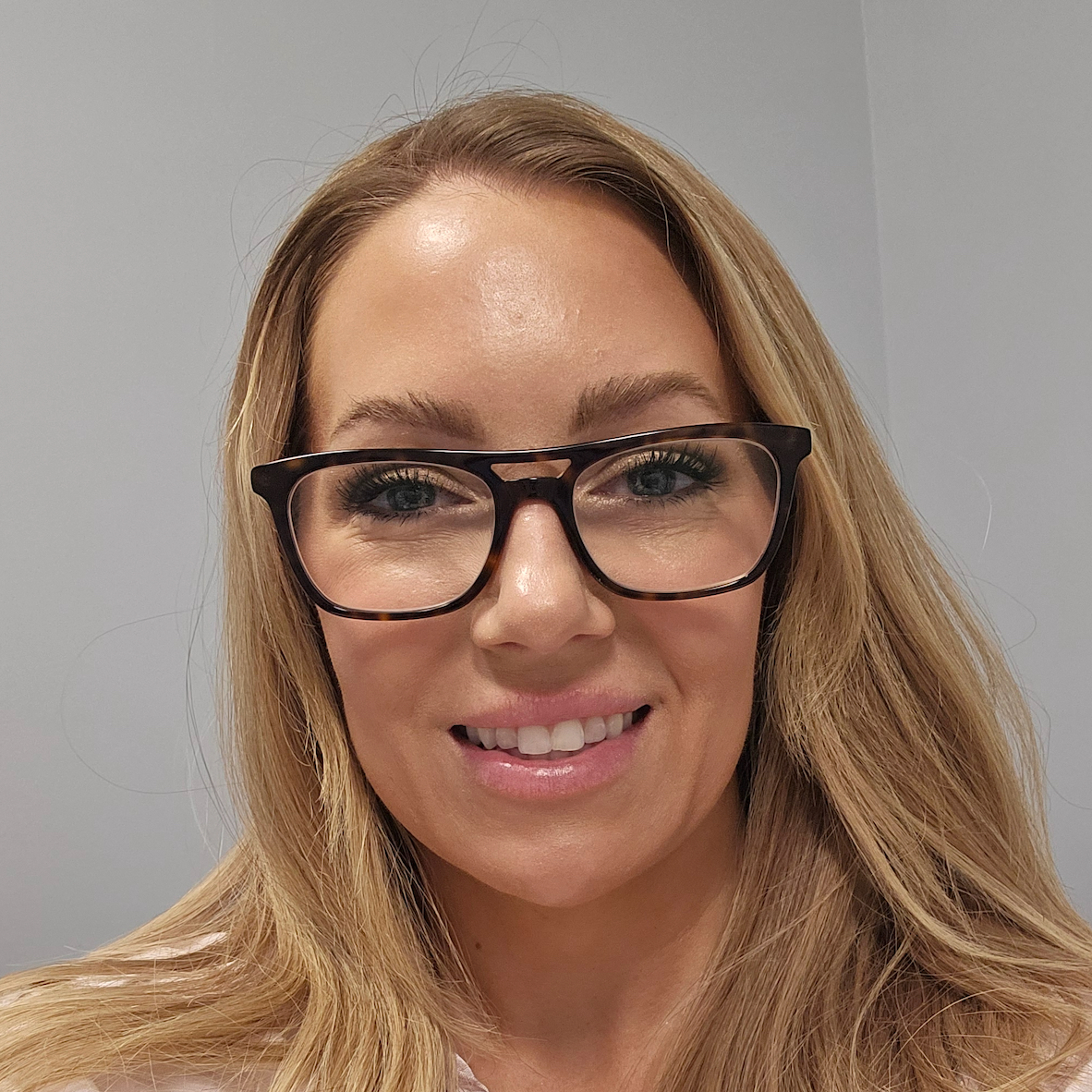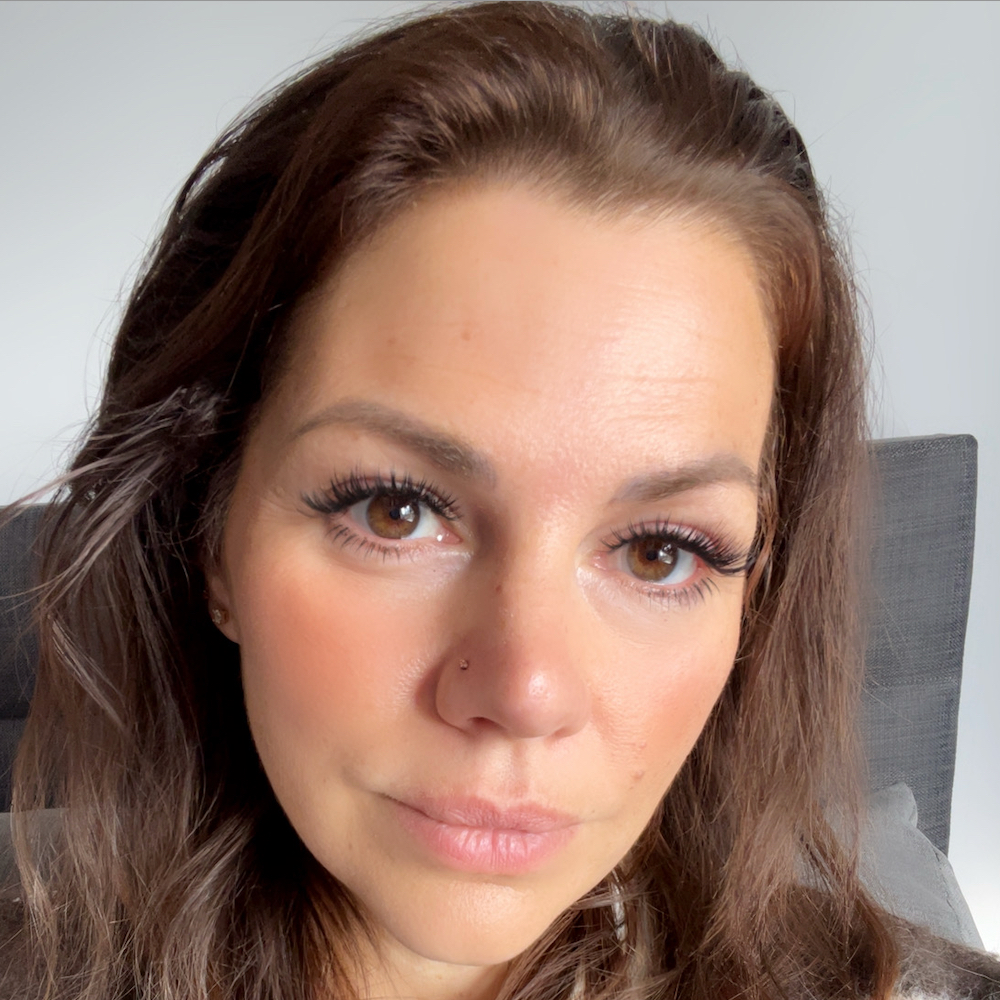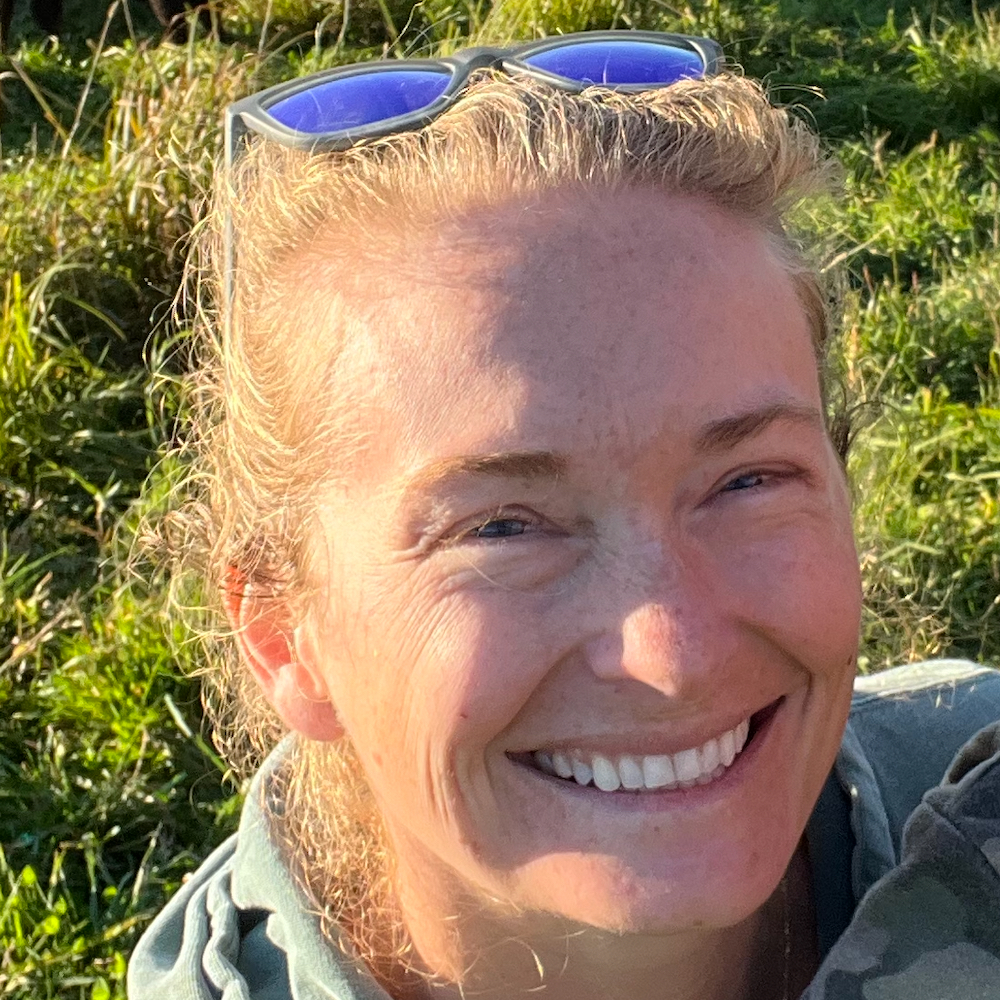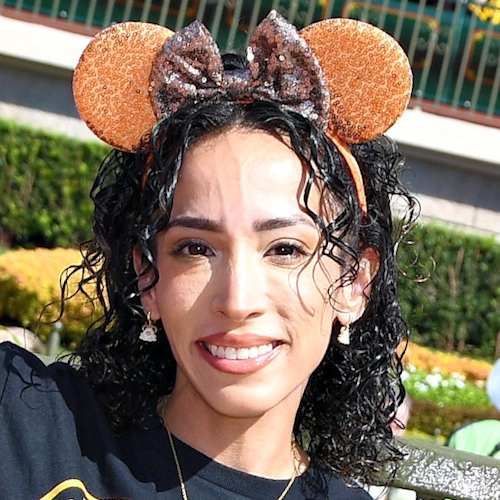“No One Should Face Stomach Cancer Alone”: Andy’s Stage 4 Stomach Cancer Story
Andy was diagnosed with stage 4 stomach cancer in August 2021, and doctors gave him only six to nine months to live. Nearly five years later, he’s still here. His experience highlights the importance of mental health, self-advocacy, and embracing survivorship with hope and community support.
Interviewed by: Carly Knowlton
Edited by: Chris Sanchez
Andy ignored symptoms like severe fatigue, exhaustion, and shortness of breath for nearly two years. By the time he saw a doctor, tests revealed anemia and a perforated ulcer, which led to his stomach cancer diagnosis. Hearing the words “you have cancer” left him numb and disoriented, but connecting with care teams gave him clarity. He learned to advocate for himself, seeking second opinions and asking the hard questions.
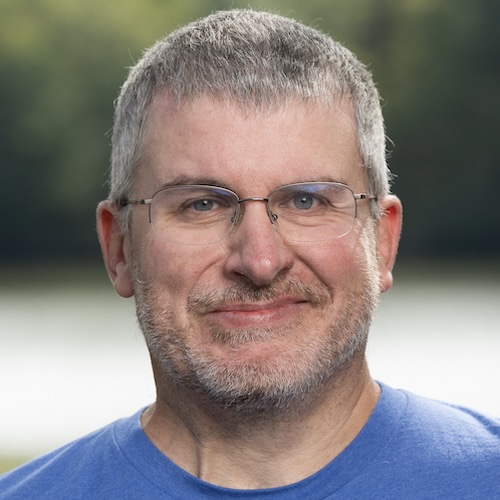
The first six months after Andy found out that he had cancer were the hardest, physically and emotionally. He underwent chemotherapy and immunotherapy. Chemotherapy was brutal and brought side effects like neuropathy, extreme fatigue, and temporary hair loss. He leaned heavily on his wife, Simone, and his online community for support.
Andy found his transition to immunotherapy life-changing. Side effects were minimal, and his scans started to show progress. Those signs of improvement fueled his hope and encouraged him to keep moving forward.
Survivorship for Andy isn’t just about the absence of disease; it’s about living intentionally and supporting others. He joined advocacy groups like Hope for Stomach Cancer and Man Up to Cancer, finding camaraderie and a safe space to share fears and victories. He participates in retreats, meet-ups, and awareness events, including leading a walkathon for the Maine General Day of Hope. Through these efforts, he empowers others to seek help, connect with community, and focus on small daily wins.
Andy firmly believes that no one should face stomach cancer alone. His story reminds us that hope often comes from the people who walk beside us and encourage us to find purpose and joy every day. Watch his video and read through his interview transcript to find out more about his story.
- He was given 6–9 months to live, but five years afterwards, he’s still here
- Chemotherapy nearly broke Andy, but immunotherapy gave him hope. Find out why!
- He leveraged his experience into a mission to help others
- The bell-ringing moment Andy will never forget
- Finding strength, support, and small yet meaningful victories in the darkest times
- Name: Andy G.
- Diagnosis:
- Stomach Cancer
- Age at Diagnosis:
- 42
- Staging:
- Stage 4
- Symptoms:
- Stomach pain
- Back pain
- Chest pain
- Extreme exhaustion
- Shortness of breath after short walks
- Treatments:
- Chemotherapy
- Immunotherapy
This interview has been edited for clarity and length. This is not medical advice. Please consult with your healthcare provider to make informed treatment decisions.
The views and opinions expressed in this interview do not necessarily reflect those of The Patient Story.
- My name is Andy
- How I knew something was off
- When I heard the words “you have cancer”
- How I found my care team
- I was not eligible for surgery
- I had side effects from chemotherapy
- How my diagnosis affected my everyday life
- The hardest part of my diagnosis
- I went into remission
- I look at life differently now
- My support system
- How I spread awareness
- I go on cancer retreats
- I am monitored often
- What survivorship looks like to me
- What I want others to know
My name is Andy
On 20 20th August 2020, I was diagnosed with stage 4 stomach cancer. It had spread to my liver, my lymph nodes, and the surface of my bones. So it was a pretty dire situation. I was given 6 to 9 months to live, and surprisingly, I am still here almost five years later. Wow.
I’m actually a YouTube vlogger, so I like to travel and I like to vlog my travels. That’s basically where my interest lies. Additionally, I am a cook by trade, so I enjoy cooking at home.
How I knew something was off
In 2019, about two years before my diagnosis, I was on vacation in South Beach, Miami, right in the middle of COVID. On that vacation, I started to feel very tired. I was getting very weak and a little out of breath after walking short distances. I was also having some nausea and stomach and bowel issues, some pretty severe heartburn, which I’ve always kind of had throughout my life, off and on. So I wasn’t really concerned with it then. But the main red flag for me at that point was the fatigue.
My wife and I decided to go see a doctor. But because of the pandemic, it was very hard to get in to see anybody at first. Once I finally did see a doctor, they mostly looked at my heart. I got on some medications for that, and unfortunately, they didn’t work. And things started getting worse.
I was starting to fall asleep at work. I was working in the restaurant industry, standing on my feet for around 15 hours a day, and almost falling asleep while standing up. That obviously wasn’t right.
So down the road, I had a few more tests, including some blood tests and an endoscopy. They revealed that I had anemia as well as a large ulcer in my stomach that had perforated the stomach walls. And that’s pretty much how I came to find out that I had stage 4 cancer.
I kind of ignored the symptoms for about two years. So I think if I hadn’t ignored those or if they had been properly diagnosed, then I probably wouldn’t have ended up stage 4. But unfortunately, I think it progressed quite rapidly during the course of those two years.
When I heard the words “you have cancer”
The feelings that I had will stick with me forever. I remember that very first phone call, during which they told me that I had cancer and that it may be stage 4. They weren’t sure it was stage 4, but they definitely knew it was cancer.
I remember looking at the mirror and not really recognizing myself. It was almost an out-of-body experience. I was completely numb. I mean, there were people there and they were talking and I was talking back, but it just didn’t feel like I was in the moment and even present. It just felt like my body was there, but everything else was somewhere else.
How I found my care team
I was diagnosed in Maine at the Harold Alfond Center for Cancer Care. I got a second opinion at Dana-Farber in Boston, one of the well-known cancer centers in the United States. And they agreed with my first doctor back in Maine. So that made me feel good. Of course, in one respect, it didn’t, because they agreed that I basically had just 6 to 9 months to live, you know? I was kind of hoping for a better second opinion. I did not get it. So that reality hit very hard as well, knowing that the first doctor was correct.
I had my first treatment in Boston, and I actually blacked out for about a week after that treatment, because my body just was not used to having that many foreign substances in it all at once. And I still don’t remember it to this day. So that was my first treatment.
My second treatment was in Maine, at Yankton Fairview Hospital, and that went much better than the first one. And I continued to get my treatments there throughout my cancer journey. So more than 150 chemo treatments over about two years total.
I was not eligible for surgery
I was not a candidate for surgery, unfortunately, because the cancer had ravaged so many other areas of my body that at that point, the doctors really didn’t think it was going to matter much. And they said, the less stress on the body, the more beneficial it might be for me. So we decided not to do surgery at all. I still have my entire stomach, which is great now. It was, however, kind of depressing to know that surgery was not an option and that it wouldn’t help me.
So my treatment plan was composed of a form of chemotherapy and then immunotherapy in conjunction with that. Basically, I was told that it was going to make me more comfortable, more of palliative care. It wasn’t going to heal me. But it might prolong my life beyond 6 to 9 months if I were lucky.
I did chemo and immunotherapy for about a year and a half. Unfortunately, the side effects of the chemotherapy were so extreme with me that we discontinued it after a while. I just went straight into immunotherapy, which was much better for me physically. I had virtually no side effects at all from the immunotherapy. So once the chemo was out of my system, I felt ten times better.
I had side effects from chemotherapy
The major one for me was neuropathy. And I think that, unfortunately, it is a major issue for a lot of chemo patients. I had severe neuropathy in my hands and feet. It got to the point that I wasn’t even able to dress myself. My wife had to help me dress. I couldn’t button my shirt or pants or tie my shoes. She helped me eat and drink; even a simple water bottle hurt my hands too much.
I got lucky. I did not have too much nausea. I had a little bit here and there. But the medication primarily took care of that. I did lose my hair for probably 6 or 9 months during treatment.
I had extreme fatigue as well. I did a lot of sleeping.
How my diagnosis affected my everyday life
The first six months were really the worst. I was basically bedridden for about six months. I was able to go to the bathroom with my wife’s help and to the car to get to my treatments. But I was in a wheelchair for quite a bit of it.
My wife would help me in the shower and things like that. She learned to be a really good cook. Cancer took pretty much my entire livelihood, unfortunately. One thing I was still able to do was make a few vlogs for my YouTube channel, because I could just edit those on my laptop while sitting in my chair. And that was actually a great distraction. It gave me something to do that I actually enjoyed and took a little bit of my depression away.
The hardest part of my diagnosis
Beyond the first initial diagnosis and the shock of that, I would definitely say the chemo was the hardest thing. It really tore my insides up. Physically, I wasn’t doing well. I’d heard before I even got cancer that quite often, people will say that the chemo treatments themselves are actually worse than the cancer. I was kind of going into it naively and hoping they were kidding, and they weren’t. It was definitely pretty vicious on my body. I think a lot of the pain that I was experiencing was actually from the chemo and not from the cancer. In the long run, it worked out. But yeah, it’s very harsh.
And that’s why I advocate so strongly today. To keep trying to raise awareness and raise money so they can find different treatments that aren’t so physically exhausting and things like that. I think immunotherapy is going to be great for a lot of people. The side effects are so much less compared to chemotherapy. There’s been some great successes with it.
I’m very happy that I was a candidate for immunotherapy. I think it worked miracles for me.
I went into remission
The first scan, even after just the first three months, showed a little bit of shrinkage. And I think that’s what kept me motivated to keep on going. Every three months, it would show a little bit less cancer. And slowly it started to disappear outright.
I think that after seeing those results, it just gave me that motivation and that hope that in the first three months, I didn’t have. I had absolutely no hope whatsoever. I was pretty depressed. I wasn’t sure what I was going to do, except, well, die.
Once I saw that first scan, it gave me a little bit of a boost. I could persevere after that, basically.
I actually didn’t find out until I looked at it and saw my scans. And then I read the doctor’s report before the doctor had a chance to tell me they had an online portal for the hospital I was at. So I was able to go on that online portal and look at the results. And the results showed no evidence of disease. I’m not sure if it was me just being naive or just not believing it.
But I remember asking my wife, “Does no evidence of disease mean what I think it does?” And chuckled and smiled and started tearing up a little bit herself and said, “Yeah, I think that means they don’t see any cancer.”
And so about 2 days later, I met with the doctor, my oncologist, and I remember her walking into the office, and she had a big smile on her face, and she was all ready to give me this great news that I didn’t know anything about. And I looked at her and I smiled back and I went, “Does that mean what I think it means? She goes, “I was gonna tell you. How dare you cheat?” I stole her thunder there a little bit. But yeah, that’s how I found out.
And I remember that she hadn’t told the nurses yet, so she asked my permission to tell the nurses, and she went out. She told all the nurses, and the oncology unit applauded. And the nurses cried, and everybody just gave me hugs, and a couple of them said that they never expected that. And obviously, I never expected it either. And it was just a big weight off my shoulders, you know, just a huge relief.
It was almost the same feeling as when I got my first initial diagnosis. It was almost an out-of-body experience. It was a good one this time. But it was that same thing. I just felt kind of numb inside, not really believing it.
It was actually almost two years exactly from the day of my diagnosis. So I was diagnosed in August of 2021, and in August of 2023, I was declared NED. Wow. I just find it really ironic that it was literally within probably a week of my diagnosis that I got the all-clear.
Yeah, it took me about another year of immunotherapy just to make sure they got it all. But in 2024, I rang the bell, and I made sure that my oncology team was there with me, and my wife was there with me, and we all rang it and cried together and had more hugs.
Definitely another experience that I’ll never forget.
I look at life differently now
I try to be a lot more positive than I used to be. I try my best to make positive strides every chance I get. And I’m in a couple of different advocacy groups, which I think helps me a lot with that.
Hope for Stomach Cancer is a big one. They do a lot of work on Capitol Hill in Washington, D.C., advocating for others and on a lot of online forums and things like that. Another one that I recently joined, probably about nine months ago, is Man Up to Cancer. And I’m very glad I found them. That is exclusively a men’s cancer group. It has about 3,000 members, most of them in the United States. But we do have some international members as well. Their motto is, “No man should go through cancer alone.” That really resonates with me, because you do feel very, very alone when you have cancer. Even though you’re surrounded by people, it’s just that people don’t understand cancer unless they’ve had it. They don’t understand the physical feelings. They don’t understand the mental aspect of it. And in groups like Hope for Stomach Cancer and Man Up to Cancer, that’s where you have people who truly understand you. And that’s where you truly have that fellowship and that journey and those people who will walk with you.
You must have people to walk with you, support you, and give you strength. As I said earlier, I couldn’t find a whole lot of hope in the first six months. You don’t find hope when you look at a scan and you’re lit up like a Christmas tree. You don’t find hope when your wife is crying because of the news that you only have six months to live. You don’t find hope when you’re sitting in a chemo chair and you’re getting fluids pumped into you for eight hours, and there are people beside you that you know are doing the same thing.
It’s hard to find hope in any of those situations. But when you have a group of people around you who are cheering you on and who are having that strength for you because they know you don’t. That makes a world of difference.
Nobody should have to walk alone. By having that support system and having people who can walk with you, that’s truly when miracles can happen. And I think that’s a big part of why I’m still here today. I had those people fighting for me when I couldn’t.
And that’s what I’m trying to do now. Fight for other people the way that people fought for me.
My support system
My wife Simone took care of everything. She actually works in the medical field herself. So that was very beneficial to me because she understood a lot of the medical terms that I didn’t. When I didn’t have the energy to research different things, she would do that for me. I remember her sitting beside me on the couch and researching on the computer while I was in agony from the side effects of my treatment. She dealt with insurance agents. And she cooked for me, so that was a huge help. She was home with me for the first 90 days after my diagnosis. She took a leave from work so she could be with me. And she also did the stuff that nobody wants to talk about. She wheeled me around in a wheelchair, which is very humbling. She drove me around for two years when I couldn’t drive because I was on so many painkillers and drugs for pain management. So I think Simone was my main advocate.
But a lot of the YouTube community helped me out as well. I have a lot of YouTube friends. When I first got diagnosed, they held a fundraiser for me. It was a 48-hour fundraiser, and there were, I think, ten different YouTube channels involved. All ten channels went live for an hour, and they asked for donations to my GoFundMe page. Wow. And they did specific things that they knew I would enjoy. Like a couple of them did cooking segments, things like that.And they were able to earn almost $20,000 in a matter of two days for me.
How I spread awareness
When I was really deep down in the trenches of chemo, the only vlogs I was able to do were about cancer. And I think those kinds of things helped me with my own emotions because I was able to get out and talk about it.
I did a couple of live YouTube shows where people would just ask me questions and I’d answer them as best as I could.
I go on cancer retreats
Man Up to Cancer is a big advocacy group. We do monthly meetups, usually at a restaurant, a bar, a pub, or similar places. Once a year, we have a large meetup in the wilderness of Pennsylvania in the Poconos. And it’s basically three days of just men getting together, hanging out at the campfire, and chatting about their experiences and just enjoying life. Hot air balloons, archery, axe-throwing, zip-lining, obviously hiking because you’re in the woods, and so on. We call it the Gathering of Wolves because we consider ourselves a wolf pack, and we got tattoos. I just got myself a brand new tattoo, and that’s the wolf pack logo right there for the cancer group.
There are a couple of conferences every year. One just concluded in Los Angeles last week. They go to Washington, D.C. every spring, where they have a three-day conference and an advocacy day on Capitol Hill. There, you’re able to talk to some of the senators and congressmen, and advocate for stomach cancer.
I am monitored often
I get scans now every six months. After you’ve been given that all-clear, a lot of people just think that life returns to normal. Unfortunately, there is no normal after a cancer diagnosis. There’s no going back to what you were before that.
It’s like every ache and pain I have, whether it originates from my stomach or my ear or my head or my finger, I always think, “What is that? Is that cancer?” In between those scans, every time you have any kind of illness, you kind of associate it with cancer again. It’s just kind of the same mental battle. Scanxiety definitely is a real thing. I’m lucky enough now that I’m getting where I’m getting my scans.
My whole theory is to just try not to focus on it. Try to focus on the positives every day. Another mantra of the cancer group is to live your best day possible. Just be able to get up and go to the bathroom by myself without any help. If I could do that, that would be an accomplishment. That was the best thing I did all day. And nowadays, my best day possible is helping others. If I can, if I can talk to another cancer patient online or on Facebook Messenger and help them somehow, that gives me some fulfillment. And that makes it a good day for me.
What survivorship looks like to me
I’m technically retired from real work. As soon as I got my diagnosis, I unfortunately had to resign from my job simply because of the side effects, the chemo treatments, and the schedule. And I decided after I had the all-clear that I didn’t really care to go back to work. I was lucky enough to survive, and I didn’t want to waste the rest of my life.
Being in a job for 40 hours a week, I wanted to enjoy my life as much as I could. Because that’s another reality with cancer, you always know that it could come back at any moment. So you want to live every single day that you have as best you can and to the fullest.
The advocacy work that I’m now doing gives me the fulfillment that I need in my life. It’s the Maine General Day of Hope on October 4th. I’m the grand marshal for that. I’ll be leading a walkathon. It’s about a two-mile walk. It’s about 7,000 people, cancer patients, caregivers, and survivors. I’ll be doing a little talk at that as well.
What I want others to know
Don’t give up. And find hope.
I really didn’t have any hope those first 3 or 4 months of my treatments. And I had to search really deep down inside to get that hope. I had lots of anger and depression. It’s very easy to become depressed and be angry. It’s not so easy to find hope. But I found it in those around me.
And so that brings me to my next thing, which would be: don’t go it alone. Join these groups. There are all kinds of groups on social media nowadays that can help you out. You don’t have to be alone in your journey. There are always people around you who will care for you and help you. Walk with somebody else and find your strength. Find a reason to live. Make every day your best day possible. And just keep on going.
Set yourself small goals. Don’t give up on life. Find a reason to live.

Inspired by Andy's story?
Share your story, too!
More Stomach Cancer Stories
Andy G., Stomach Cancer, Stage 4 (Metastatic)
Symptoms: Stomach pain, back pain, chest pain, extreme exhaustion, shortness of breath after short walks
Treatments: Chemotherapy, immunotherapy
...
Alyssa B., Stomach Cancer, Stage 4 (Metastatic)
Symptoms: Fatigue, elevated resting heart rate, heartburn, difficulty swallowing, weight loss
Treatments: Chemotherapy, immunotherapy, surgeries (total gastrectomy; partial esophagus removal; bilateral oophorectomy and fallopian tube removal), clinical trial
...
Brittany D., Stomach Cancer, Stage T1b
Symptoms: Choking suddenly while eating and attempting to speak, neck and right shoulder pain, neck tightness, trouble swallowing certain food items
Treatments: Surgeries (subtotal gastrectomy, D1 lymphadenectomy, gastric bypass)
...
Camilla C., Stomach Cancer, Stage 4 (Metastatic)
Symptoms: Issues swallowing, swollen gland in the neck
Treatments: Palliative chemotherapy was offered but declined, nutritional changes to support her comfort and energy, meditation and mindfulness practices, self-directed healing methods
...
Emily D., Stomach Cancer (Gastric Adenocarcinoma), Stage 4 (Metastatic)
Symptoms: Persistent postpartum stomachache, early satiety, difficulty swallowing, vomiting
Treatments: Chemotherapy, immunotherapy
...
Alyssa B., Stomach Cancer, Stage 4 (Metastatic) (Hospice Update)
Symptoms: Fatigue, elevated resting heart rate, heartburn, difficulty swallowing, weight loss
Treatments: Chemotherapy, immunotherapy, surgeries (total gastrectomy; partial esophagus removal; bilateral oophorectomy and fallopian tube removal), clinical trial
...
